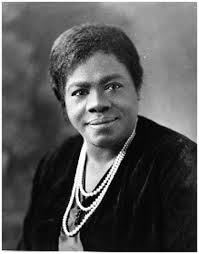|
Born July 10 1875, in Mayesville, South Carolina, her parents were former slaves and her family lived in poverty, but Mary did not let her situation define the rest of her life. As one of seventeen children they all were responsible for contributing to their household duties; they toiled fields and picked cotton on a regular basis. Mary was the only member of her family to attend school, the missionaries who were in her area opened a school for African-American children. Mary was determined to succeed even as a child. She walked miles to and from school every day to receive her education. She was also tasked with sharing the information she learned in school with her siblings. Mary was awarded a scholarship to attend the Scotia Seminary, an all-girls school in Concord, North Carolina. In 1893 she graduated then advanced to the Dwight Moody Institute for Home and Foreign Missions. Mary completed her studies within two years then returned to the south to become a school teacher. Nearly ten years passed as Mary’s career as an educator was taking off. In 19898 she would met and marry Albertus Bethune, they had one son Albert McLeod Bethune before the couple divorced in 1907. Mary McLeod Bethune strongly believed that education was the key to the advancement of the black race. In 1904 Mary founded the Daytona Normal and Industrial Institute for Negro Girls in Daytona, Florida. The school started with only five students but grew into an Institution educating more than 250 students in a few short years. Mary McLeod Bethune was the institute’s first president even after the school combined with the Cookman Institute for men in 1923. The combining of the two schools produced Bethune-Cookman College. This college was one of the few places blacks go attend to receive higher education at the time. Mary remained the president of the College until 1942. She was also an activist within her community in her free time. She became president of the Florida chapter of the National Association for colored Women in 1924. She also served with the government for a few Presidents. She attended a conference on child welfare with Calvin Coolidge, served on the commission for Home Building and Home Ownership, and was appointed to the committee on child health under Herbert Hoover. She is widely recognized for her role in public service under the President Franklin D. Roosevelt. In 1935 she became an adviser to Roosevelt on minority affairs. Also in 1935, Mary was able to create the National Council of Negro Women. In 1936 she became the director of the Divisions of Negro Affairs of the National Youth Administration; Mary was charged with helping young black people find job opportunities. After serving as President of Bethune-Cookman College she became an early member of the NAACP and represented the group along with W.E.B. Dubois at a national conference in 1945. In 1950 President Harry Truman appointed her to serve as the official delegate to a presidential delegation in Liberia. In 1955 Mary McLeod Bethune died, but her legacy still lives on to this day. Mrs. Bethune quoted; “I leave you a thirst for education. Knowledge is the prime need of the hour.” Also; “If I have a legacy to leave my people, it is my philosophy of living and serving.” In 1973 she was inducted into the National Women’s Hall of Fame, a postal stamp was created in her likeness in 1985, and in 1994 the U.S. Park Service brought the former headquarters of the National Council of Negro Women, and renamed it the Mary McLeod Bethune Council House National Historic Site. Creating an Institution that blacks can earn an education from hundreds of years after her death, makes Mary McLeod Bethune a giant among us all. Mrs. Mary McLeod Bethune, we stand on your shoulders. J.A. Ward. Click below to view the Mary McLeod Bethune video
0 Comments
Leave a Reply. |
Details
Categories
All
Click Here to join our mailing list
|
Contact Us: |
Connect With Us |
Site powered by PIT Web Design


 RSS Feed
RSS Feed



